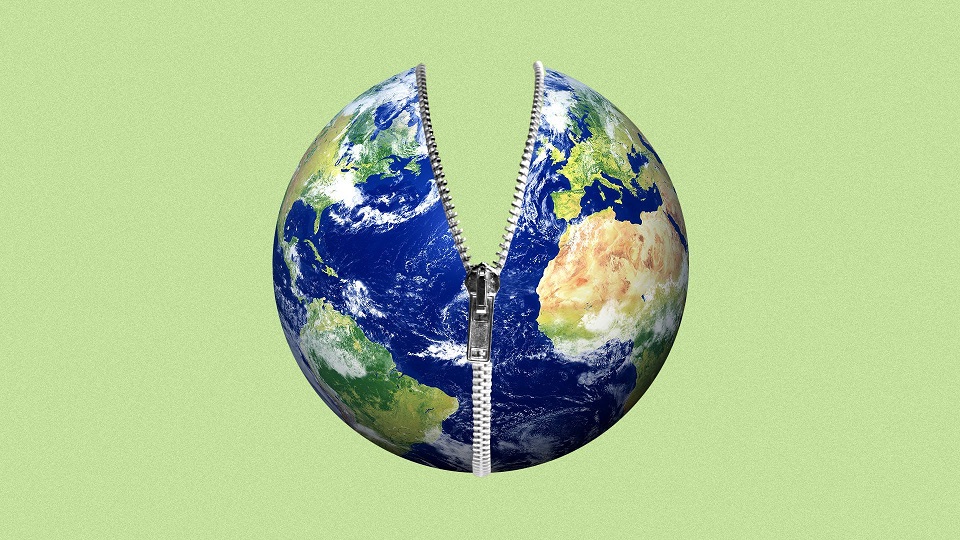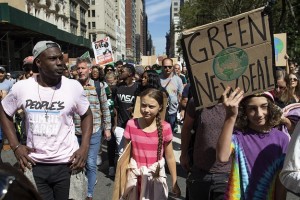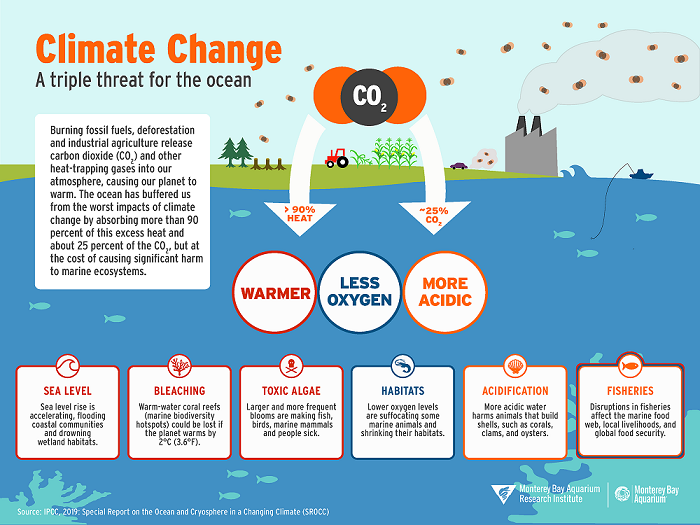Make a healthy climate a legal right
that extends to future generations
Noted British magazine The Economist recently held its ‘Open Future Essay Competition 2019’ on the question “What fundamental economic and political change, if any, is needed for an effective response to climate change?” Following is the winning essay of the Competition that beat nearly 2,400 entries from over 110 countries. It was penned by Larissa Parker who is a research associate at the McGill Law, Governance and Society Lab and works with the Youth Climate Lab.
In March 2019 I joined over 100,000 young people to strike in the streets of Montreal. We claimed the downtown area for hours, demanding increased climate action from our decision-makers. Children of all ages attended, marching for their right to grow up in a healthy world.
In the last decade the not-in-my-backyard phenomenon has turned into a not-in-my-lifetime one. After attending the United Nations climate conferences as a youth delegate for years, I have watched governments around the world put short-term economic gain before the long-term well-being of the planet and my generation. Although 195 nations committed to rapidly reduce greenhouse-gas emissions to keep the global average temperature well below 2°C relative to pre-industrial levels, many countries are nowhere near achieving their targets. In Canada, for example, current policy decisions have resulted not only in no reductions, but an increase in greenhouse-gas emissions. The latest national inventory report indicated that emissions rose by 8m tonnes from 2016 to 2017, an increase of about 1%.
This accountability problem is rampant across the world, yet few legal systems are equipped to address it. Although climate litigation is becoming a new front for climate action, with hundreds of cases arising around the world, they are limited in scope. Today, for the most part, only current generations have legal standing to sue; and to do so, they have to prove the impacts that they have experienced or are experiencing. This is problematic in the context of climate change because the effects of greenhouse-gas emissions take decades to manifest themselves. This renders it incredibly difficult to contest today’s polluting activities as their impacts have not been felt yet. It is also why governments feel little pressure to meet their commitments or take strong action.
I came to law school with high hopes of changing this. One solution is to recognise the rights of future generations to a healthy environment, which would open the door for lawsuits on climate inaction and keep governments accountable to their commitments under international law. If a government does not take sufficient action on climate change now, then it is not doing enough to prevent harm to future generations, thus violating their rights to a healthy environment.
The problem arises from the legal standing of future generations—or lack thereof, for they are generally not currently considered identifiable individuals under the law. Although it is easy to grasp their fundamental interest in a healthy environment, the law is reluctant to grant them recognition. This is because most of those individuals have not been born yet. How or when they will experience the impacts of climate change remains undetermined. Nevertheless, they represent our children, grandchildren and great-grandchildren. It is conceivable that, at the very least, we have a duty to ensure they inherit the planet in a condition that is comparable to ours.
This type of thinking has already led a handful of legal systems to begin recognising such rights, at least in limited form. Most famously, in Oposa v Factoran, the Supreme Court of the Philippines accepted that a class action could be filed on behalf of future generations to denounce logging licences. Notably, the court also affirmed that natural resources are held in trust for the benefit of present and future generations, and that the government was consequently required to protect them. A similar case was introduced in Pakistan in 2015, where a seven-year-old girl, represented by her father, filed a petition against the state for violating the constitutional rights of today’s youth and future generations because of its failure to combat climate change. In 2016 Pakistan’s Supreme Court allowed the case to proceed. It is still pending. Several cases against governments in the United States, Canada and Britain are also in progress.
Although it has limitations and is often slow, the ability of the law to modify and enforce norms, values and behaviour is significant. Through legislative and administrative developments, as well as through judicial reinterpretations of constitutions, statutes or precedents, law has the power to articulate the course for social transformation. Take Edwards v Canada (AG)—a famous Canadian case which ruled in 1928 that women were eligible to sit in Canada’s Senate. At the time, women were not yet considered “persons” as far as the constitution was concerned. The decision redrew the boundary around who could be considered a ‘person’ under the law and ensured that women would no longer be denied rights based on its narrow interpretation.
There are advantages that come from granting rights and legal standing. For all their shortcomings, legal rulings are often seen as legitimate, authoritative and enforceable because of the independence of the judiciary. And legal decisions tend to set precedent for years to come.
Of course, the law does not do this on its own. It usually occurs in response to a shift in a society’s values. To me, this shift is increasingly evident in the climate movement. A rising number of youth around the world are coming together to urge their governments to take stronger action to combat climate change and avoid its catastrophic effects. They are engaging in civil disobedience, such as school strikes, and have initiated lawsuits to stop various polluting activities or to demand stronger policy responses.
I hope that before long judges and decision-makers heed these voices; they are only getting louder. The slow-onset nature of climate change, and the difficulties of establishing accountability from one generation to the next, make it necessary to develop and adopt new legal principles that articulate the rights and obligations underpinning intergenerational equity. Formal recognition of the rights of future generations would expand the scope of climate litigation and allow present-day litigants to sue on their behalf. Although it is simply one path of many that will be required to achieve climate justice, enshrining the rights of future generations to a healthy Earth could have lasting impacts on judicial and policy decisions for decades to come.
How to respond to climate change
The Economist fed the essay question and the 58-word description through a natural-language processing algorithm called GPT-2, released publicly in February by OpenAI, a group working on AI research and ethics, based in San Francisco, USA. The result was six roughly 400-word texts. The Mag took the larger parts of three of them and placed them one after another with no other editing. The AI-written essay is below.
Question: What fundamental economic and political change, if any, is needed for an effective response to climate change?
- Do we want to go through the same process we have been through for decades with no changes?
Is there a way to build a sustainable energy system that is both affordable and environmentally responsible? The basic premise behind this article is that we need to transform the economics of our energy system by investing in the necessary infrastructure so that it will be affordable for everyone.
An Alternative Economy Is Possible
In our world of perpetual growth, we have an abundance of energy and the means to create the abundance we need. We are very conscious of the fact that not all people have the means to sustainably create, store and use energy. The reason? We are the ones with the means to use it and create the economic opportunity to do so, and we are the ones who will own and use the means of production. The only reason we don’t do this is because we don’t fully realize the economic implications of what we will be creating.
But why does this matter?
There is a fundamental paradigm shift that needs to happen if we are to build sustainable energy systems at the scale that we need to. Here is the scenario:
The world gets off of fossil fuels and starts producing entirely new and clean energy sources.
The world needs to build a system that maximizes the economic opportunities for working people.
For the first time in history, the world can be energy independent, allowing all people within our global communities to work together to create the economic opportunity we have all sought for decades now.
With this paradigm shift in mind, it’s perhaps time we take a moment to reflect on what we could do differently.
Is it possible to create an economy that produces enough energy to feed all the people on the planet?
Is it possible to build a system that is neither a fossil fuel nor a nuclear power plant yet has the potential to be the first and only system that maximizes the economic opportunities for all people?
Let’s explore these questions and why they matter.
- What Do We Need?
It has long been known that the rate of carbon emissions growth is rapidly declining, in part due to improvements in technology, including those to harness the earth’s abundant carbon resources. But what can be done to slow and even stop this pace of global growth? And what, if anything, needs to change in order to achieve a sustainable long-term solution to the problem of climate change?
A number of factors have been put forward. One is a rethinking of the economic model of the development economy. A related change is the rise of a new paradigm known as energy-efficiency. A more efficient, less energy-intensive way of doing business also involves a shift in thinking about the economic and social context of global warming and the importance of carbon reduction in a changing environment. Finally, it should be noted that while many countries have reduced their carbon emissions, some countries are still growing their emissions at a greater rate than others.
The Intergovernmental Panel on Climate Change (IPCC) has called for a three-way approach to dealing with climate change, in which governments, rich and poor, seek to reduce emissions, the developing countries to take steps to combat climate change and the developing countries to take steps to adapt to climate change. The IPCC also recognizes that the best way to manage climate change is through adaptation to change and mitigation.
How Will We Respond?
While the IPCC’s report is the most comprehensive and comprehensive global assessment of the climate change problem to date, it is still an incomplete picture. While the IPCC has proposed a number of important measures, its recommendations are based on incomplete assessments. It is likely that much more will be required before the issue is addressed, and some of the problems identified in the IPCC report will be very real.
One important step would be to examine how we can respond to global warming by taking steps to meet the goals the agency has set for reducing emissions, such as the reduction of emissions from the power sector by 20 percent below 2005 levels, from the transportation sector by 30 percent below 2005 levels, and from the energy sector by 30 percent below 2005 levels. By doing so, the IPCC may also help to shape the course of action and help ensure that the United States and other developed nations will be able to deal with the issue and adapt in a cost-effective and sustainable way so as to meet the challenge.
III. The answer may lie in a different world.
To deal with the increase in human population, the value of the earth’s wealth will increase at the same pace.
This means that unless massive and rapid improvements in the technology to harness the immense productivity of the earth’s resources can be made, the earth’s future is in serious danger. The Earth’s resources will become less abundant, the world’s population will rise rapidly, and a new type of natural disaster is increasingly likely.
The rapid increase in the value of the world’s wealth will reduce the amount of energy available for conservation and economic development, and will therefore increase the amount of carbon dioxide (CO2) in the atmosphere.
This will cause more extreme weather, more violent and often violent conflict, and more frequent and severe droughts.
This will increase the risk of famine and the rise of disease and other infectious diseases. In addition, increasing income and wealth will allow more people to enter the cities and develop more damaging forms of pollution.
On a global scale, the impacts of global warming will become worse and greater, creating new conditions and opportunities for environmental destruction, with more extreme weather events, more severe droughts, and more frequent and severe weather events.
We must recognize this risk to the future of human civilization, and act now to respond.
 Jahangir's World Times First Comprehensive Magazine for students/teachers of competitive exams and general readers as well.
Jahangir's World Times First Comprehensive Magazine for students/teachers of competitive exams and general readers as well.









